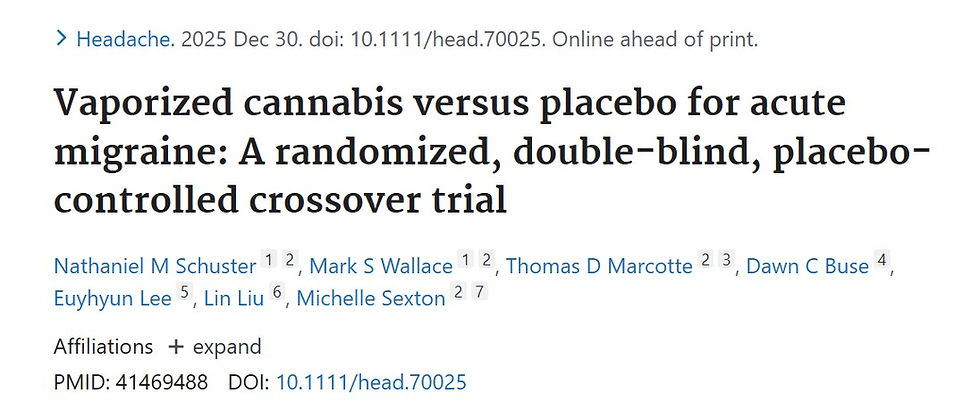Research Roundup: Oct 3, 2023
- Lex Pelger

- Oct 3, 2023
- 3 min read

Best of cannabinoid science this week...
In Australian patients with chronic health conditions, three months of medical cannabis caused meaningful improvements in overall quality of life as well as better scores for anxiety, depression & pain Health-related quality of life in patients accessing medicinal cannabis in Australia: The QUEST initiative results of a 3-month follow-up observational study https://pubmed.ncbi.nlm.nih.gov/37672515/
In people with HIV taking antiretrovirals, cannabis use was associated with an increased abundance of T cells, a reduction of effector T cells (which promote inflammation) & lessened markers of activation, exhaustion & senescence
Impact of cannabis use on immune cell populations and the viral reservoir in people with HIV on suppressive antiretroviral therapy
In an Italian center, all 18 of their epilepsy patients in this study experienced quality of life improvements from isolated CBD with no negative effects on daytime sleepiness Highly purified cannabidiol in the treatment of drug-resistant epilepsies: A real-life impact on seizure frequency, quality of life, behavior, and sleep patterns from a single Italian center https://pubmed.ncbi.nlm.nih.gov/37677907/
A thesis project finds cannabis combines well with yoga Cannabis under the influence of yoga : the impact of mindful movement on well-being outcomes after cannabis use https://open.library.ubc.ca/soa/cIRcle/collections/ubctheses/24/items/1.0435753
For canine osteoarthritis, a meta-analysis of five studies found CBD caused a reduction in pain severity Efficacy and safety of cannabidiol for the treatment of canine osteoarthritis: a systematic review and meta-analysis of animal intervention studies https://www.frontiersin.org/articles/10.3389/fvets.2023.1248417/full
A review of 61 studies on the positives of CBD THERAPEUTIC POTENTIAL OF CANNABIDIOL: THE MOST IMPORTANT ACHIEVEMENTS ON THE WAY TO A NEW ERA https://msu-journal.com/index.php/journal/article/view/513 “Based on the analysis of experimental and clinical studies, it was established that cannabidiol has various properties, including antiapoptotic [anti cellular suicide], antioxidant, anti-inflammatory, antipsychotic and neuroprotective. In addition, basic and clinical studies of the effects of cannabidiol have been conducted in the context of many other health conditions, including its potential use in epilepsy, depression, neurodystrophic diseases, schizophrenia, and social phobia.”
A review of cannabinoids & the GI tract Cannabinoids and the GI Tract https://pubmed.ncbi.nlm.nih.gov/37678488/
In a rabbit model of psoriasis, cannabis oil significantly lowered inflammation & dermal alterations Effect of Topical Application of cannabis fixed Oil on Imiquimod-Induced Psoriasis-like Lesions in the Thin Skin of Adult Male Albino rabbits https://jpet.aspetjournals.org/content/385/S3/295
In a mouse model of trauma, CBD caused long-term protection against fear relapse after a successful extinction of the memory as well as causing less stress induced impairments Cannabidiol regulation of extinction and relapse of learned fear https://eprints.nottingham.ac.uk/73041/
In a rat model of chemotherapy treatment, CBD protected the liver via anti-inflammatory & antioxidant effects Prospective Affirmative Therapeutics of Cannabidiol Oil Mitigates Doxorubicin-Induced Abnormalities in Kidney Function, Inflammation, and Renal Tissue Changes https://assets.researchsquare.com/files/rs-3278591/v1/d8fb50af-513e-4706-8de8-c7951b5bc2be.pdf?c=1693613478
In immune cells, CBD lowered the production of inflammatory agents (eicosanoids) & stimulated the production of anti-inflammatory agents (specialized pro-resolving mediators (SPMs)) Cannabidiol acts as molecular switch in innate immune cells to promote the biosynthesis of inflammation-resolving lipid mediators https://pubmed.ncbi.nlm.nih.gov/37647900/
In gum tissue stem cells, CBD promoted proliferation & migration & caused no toxicity Proliferative effect of cannabidiol in human gingival fibroblasts via the mitogen-activated extracellular signal-regulated kinase (MEK) ½ https://pubmed.ncbi.nlm.nih.gov/37641169/
In a tissue model of type 2 diabetes, CBD, CBG, BN & THC all inhibited the dipeptidyl peptidase IV enzymes (related to glucose homeostasis) Inhibitory Effects of Selected Cannabinoids Against Dipeptidyl Peptidase IV, an Enzyme Linked to Type 2 Diabetes https://papers.ssrn.com/sol3/papers.cfm?abstract_id=4528268
In a rat model of depression, PEA increased neuroplasticity in the hippocampus (memory center of the brain), reduced apoptosis (cellular suicide) & increased neurogenesis (the production of new neurons) N-palmitoylethanolamine modulates hippocampal neuroplasticity in rats with stress-induced depressive behavior phenotype https://www.sciencedirect.com/science/article/abs/pii/S0014299923005538
In a mice being given fentanyl, activation of the CB1 receptor increased the painkilling properties Effects of Cannabinoids on Fentanyl Antinociception https://jpet.aspetjournals.org/content/385/S3/205.abstract And in a rat model of pain, THC seemed to help the fentanyl work better Antinociceptive Effects of Fentanyl and Non-opioid Drugs in Methocinnamox-treated Rats https://jpet.aspetjournals.org/content/385/S3/411



Comments